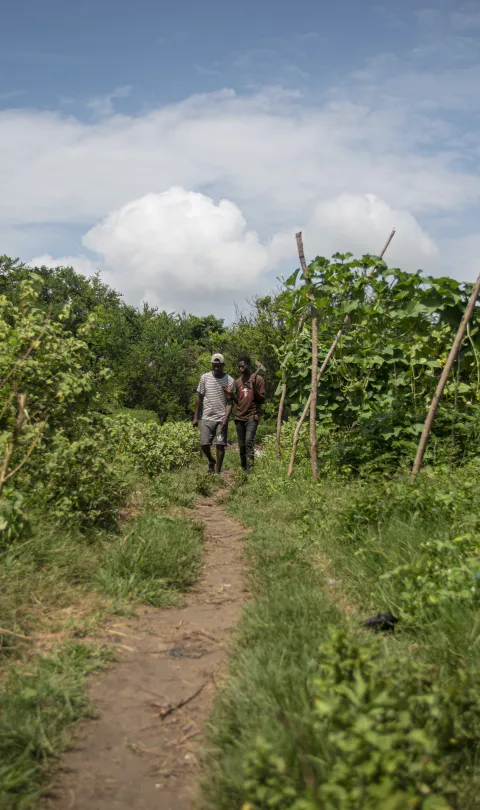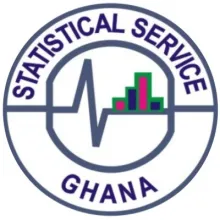According to the Food and Agriculture Organization, about two billion people in the world experience moderate to severe food insecurity. Particularly in sub-Saharan Africa, slow progress on combating food insecurity can be attributed to a lack of sustainable agricultural productivity and the impact of climate change, among others. In Ghana, the agricultural sector employs more than half of the country’s labor force. Farmers face a multitude of obstacles, including low productivity levels due to increasing climate variability, economic stressors such as high post-harvest losses, and a lack of market information on the value of their crops and livestock. Many farmers, for instance, follow the traditional calendar for planting, but often climate change alters the expected weather patterns and increases chances of crop loss due to disasters such as drought and flooding.
Across Ghana, there is inadequate information on various characteristics of farmers, such as where they are located, what crops they plant, and how they are building resilience to the aforementioned external factors. More timely data is crucial in order to monitor and improve progress on Sustainable Development Goals (SDGs) 2 (Zero Hunger), 8 (Decent Work and Economic Growth), and 12 (Responsible Consumption and Production). A data ecosystem that improves farmers’ access to up-to-date and accurate information can move the needle in accomplishing these goals, thereby improving the livelihoods of many.
The Ghana Statistical Service (GSS) recognized the critical nature of this information gap. Two years ago, they called upon the assistance of the Global Partnership for Sustainable Development Data (the Global Partnership) to facilitate a collaborative of diverse and invested actors, including the Ministry of Food and Agriculture (MoFA), Esoko, and National Disaster Management Organization (NADMO), together forming a public-private ecosystem set to investigate practical solutions to this issue. Omar Seidu, Head of Demographic Statistics and SDGs Coordinator at GSS explains, “Our role as coordinators of the National Statistical System means bringing together actors across the data ecosystem to work collaboratively, not in silos. Data partnerships like this one have increasingly become the norm in driving and governing data initiatives in Ghana.” At the center of this collaborative to drive field implementation and co-fund was Esoko.
Since 2008, Esoko has been facilitating the use of mobile technology in Africa to address agricultural issues by providing services directly to farmers and connecting agribusinesses and development organizations with local communities. Tapping into this experience, the newly formed collaborative designed a project in which Esoko, using supplementary data from NADMO, MoFA, Ghana Meteorological Agency, and others, would disseminate critical information on context-specific agronomic best practices, weather patterns, and crop market prices to farmers via call centers, SMS, or voice messages. These climate-smart agricultural services would then equip farmers with insights for better land preparation, planting, and harvesting activities.
In order to monitor the efficacy of these services, a baseline survey of 644 randomly selected beneficiary farmers across 10 districts was conducted in September 2019. The Global Partnership, GSS, and MoFA contributed to questionnaire development and training of data collectors, providing guidance, a sampling frame, and quality assurance. These survey results, in addition to providing insights on intervention utility, can also be used by the MoFA to provide additional insights into some results of the recent agricultural census, as well as to encourage policy on the nascent digital property addressing system that aims to ensure a unique digital address for every location.
Various follow-up surveys have been conducted to ascertain the effect of these climate-smart agricultural services. Most recently, in October 2020, a random sample of 125 farmers were asked a variety of questions, including:
- Verification of the receipt of mobile climate information,
- How useful the messages are to their farming activities,
- Whether they apply the advice in the messages, and
- Whether they rely on Esoko’s data as their source of market price for various crops.
Of survey respondents, 97% found the information ‘very useful.’ According to some of the farmers, it was most useful for the purposes of planting and sowing seeds at the right time, selecting the application of various fertilizers, and knowledge of when to expect rainfall and prepare accordingly. Remaining nimble and up to date with this information can greatly contribute to higher productivity levels by planting at opportune times and mitigating the effects of unforeseen weather patterns. One farmer from the Upper West region said of the data: “...it has been very useful in helping me know when to plant my crops and when to expect rain. It has also helped me plan my farm activities better and to harvest more.”
Equally as important for farmers’ profitability and sustainable farming operations is access to market price information for various crops. This allows farmers to decide on the best price for their products, as well as when and where to sell. From the monitoring survey, 62% of respondents confirmed that a source of market price information was from Esoko. This reliable and easy to access market information allows farmers to better navigate the complexity of global value chains, better negotiate with sellers, and make more informed decisions about prices and transportation based on the market. This helps them improve their bargaining power to compete in a large, global system, ultimately increasing profits.
In the future, additional surveys will be implemented to continue to monitor the efficacy of the climate-smart data services. Since the start of the project, in addition to over 3.35 million individual profiles, 1,247 biometric profiles for farmers in the Upper West region, Bono region, and Bono East region in Ghana have been created. Survey data collection has also since expanded to include COVID-19 implications. Esoko is keen to continue expanding their services provided to farmers across the nation. For example, collecting gender-disaggregated data would allow for analysis of the gender disparity in land ownership, honing in on actions to be taken that address economic disparities that women face. Esoko is also working in partnership with private sector companies such as Vodafone where, in addition to ongoing services rendered to farmers, it is seeking to develop new financial models for service delivery to farmers, including exchanging mobile phone credit for these services. The initial phone survey is an important step that will ultimately help to build an evidence base to monitor the efficacy of the interventions across the country.

